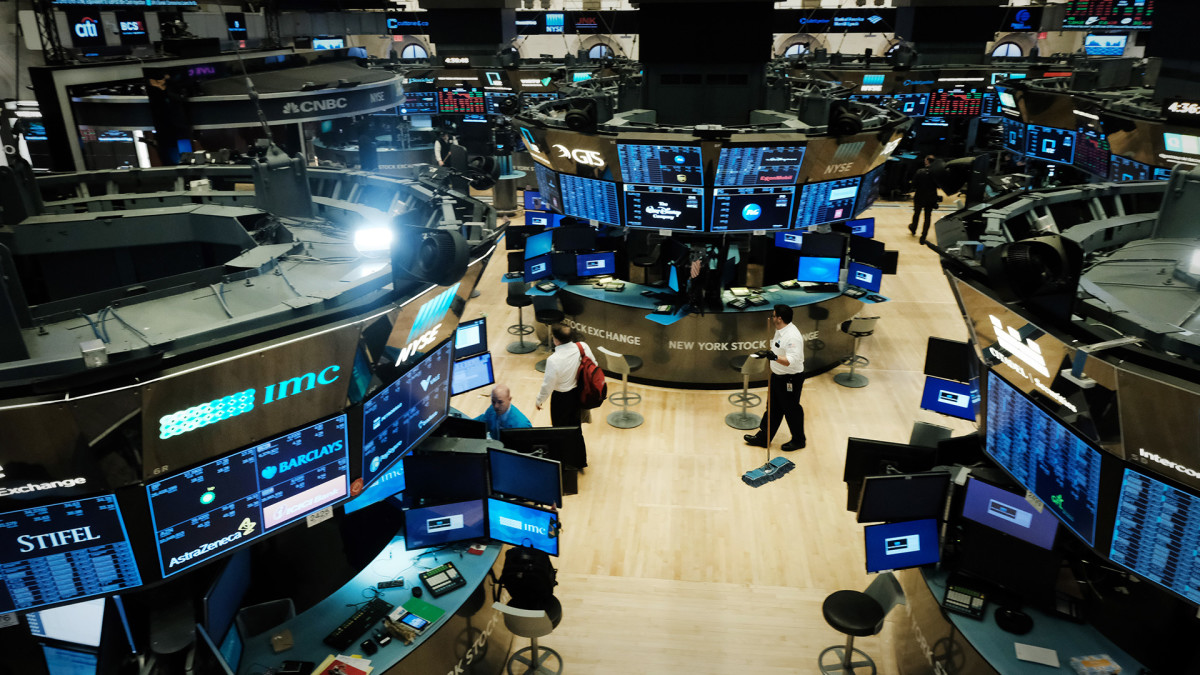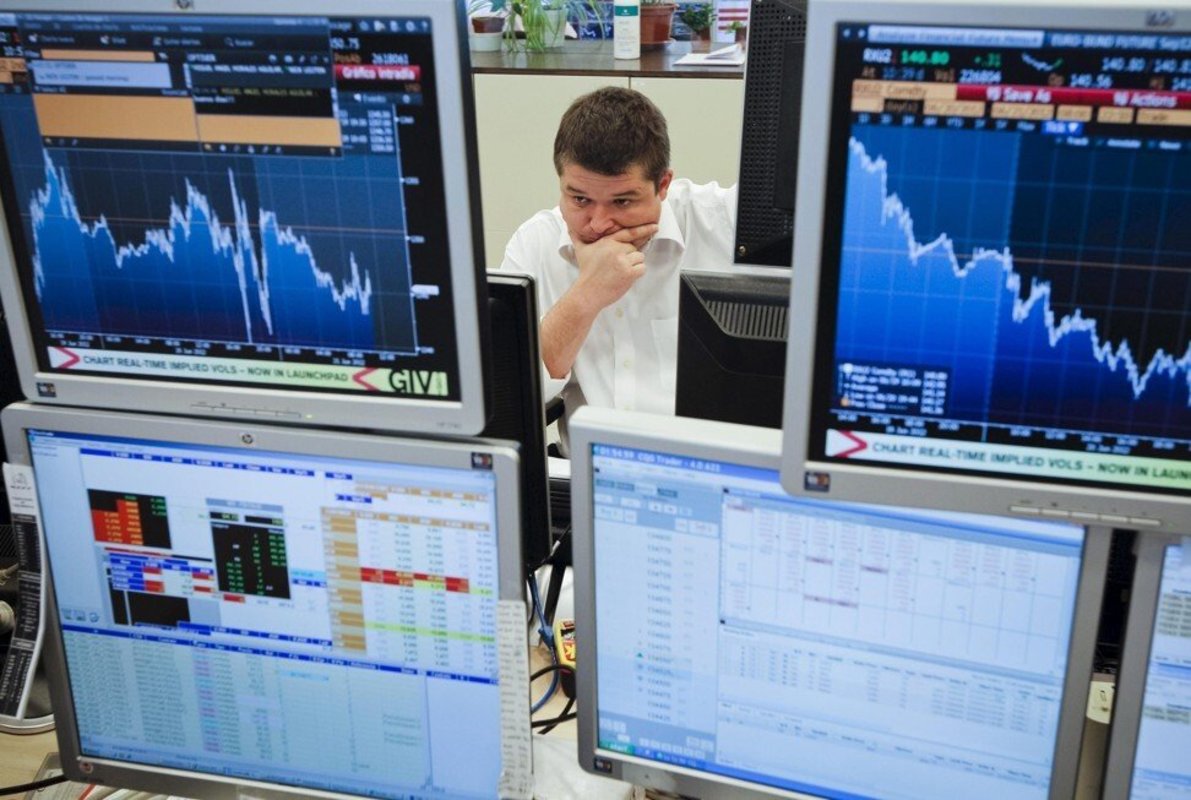
Updated 4:43 PM EDT by Rob Lenihan
Wall Street's bid to claw back declines triggered by volatility in global markets and the unwinding of trades tied to the Japanese yen fell short Wednesday, short-circuiting the previous session's rebound that snapped a three-day losing streak.
The Dow Jones Industrial Average lost 234.21 points, or 0.60%, to finish the session of 38,763.45, while the S&P 500 slipped 0.77% to 5,199.50, while the tech-heavy Nasdaq gave up 1.05% to end the day at 16,195.81.
At session highs, the Dow surged 480.30 points, while the S&P 500 jumped 1.73%, CNBC reported, and the Nasdaq was up more than 2% at one point.
After an initial surge, AI heavyweight Nvidia ended down 5.12% Super Micro Computer tumbled 20.1% after missing fourth-quarter earnings missed estimates. Tesla and Facebook parent Meta Platforms also ended in the red.
Consumers increased the amount of credit they used in June at a slower rate and Jeffrey Roach, chief economist for LPL Financial, said “consumers are feeling the pressure from elevated price levels and slowing income growth.”
“Softer demand for credit will likely impact lower-income consumers the most, but overall, the data suggest a slowdown in consumer spending for the rest of this year,” he said.
“The deterioration of financial conditions and softer trajectory for consumer spending increase the odds of the Fed acting more aggressively at the September meeting," Roach added.
Updated 1:08 PM EDT
Rough Auction
Bond investors shunned an auction of $42 billion in new 10-year notes Wednesday, with investors placing bids worth just $44.3 billion for the paper on offer amid the fallout from this week's global market volatility.
That's a sharply lower bid-to-cover ratio of 2.32, the weakest since December of 2022 and well shy of the both the six month average of 2.53 and the 2.58 level recorded during a similar auction in July.
Foreign investor participation was also muted, with so-called indirect bidders taking down 66.17%, down from 67.6% last month and the six auction average of 67.5%.
10-year note yield up 6.4 bps post auction. pic.twitter.com/aoWWfHH0T8
— 🇺🇸 GammaLab (@gammalab_tweets) August 7, 2024
Updated at 11:02 AM EDT
Super slider
Super Micro Computer shares are down 17% in early trading as analysts wade through the server maker's mixed fourth quarter earnings report and the potential impact from a delay in production and delivery of Nvidia's (NVDA) new Blackwell processors.
Super Micro shares were marked 16.7% lower in early Wednesday trading to change hands at $514.13 each, a move that would still leave the stock with a year-to-date gain of around 80%.
Related: Analysts overhaul Super Micro stock price targets after Q4 earnings
Updated at 10:18 AM EDT
Mortgage relief
Mortgage rates fell the most in two years last week, data from a key industry lobby group noted Wednesday, thanks in part to a massive bond market rally that followed the Fed's signaling of September rate cuts and a softer-than-expected July jobs report.
“Mortgage rates decreased across the board last week and mortgage application volume reached its highest level since January of this year," said Joel Kan, the MBA’s deputy chief economist. "The 30-year fixed rate fell to 6.55%, reaching its lowest level since May 2023, following dovish communication from the Federal Reserve and a weak jobs report, which added to increased concerns of an economy slowing more rapidly than expected.”
Related: Mortgage rates get huge boost from Fed signals, bond market rally
Updated at 9:45 AM EDT
Solid open
The S&P 500 was marked 76 points, or 1.46%, higher in the opening minutes of trading, with the Nasdaq jumping 320 points, or 1.96%.
The Dow added 290 points while the Russell 2000 was marked 27 points higher, or 1.33%.
S&P 500 Opening Bell Heatmap (Aug. 07, 2024)$SPY +1.25%🟩$QQQ +1.88% 🟩$DJI +0.59% 🟩$IWM +1.40% 🟩 pic.twitter.com/pWUUdswF3h
— Wall St Engine (@wallstengine) August 7, 2024
Updated at 8:11 AM EDT
Mouse House hikes
Disney (DIS) shares edged lower in premarket trading after the media and entertainment group posted better-than-expected third quarter earnings that included a maiden profit for its streaming division.
Disney's workhorse Parks unit, however, saw operating profit fall 3% amid a pullback in consumer spending, which the group expects to continue over the coming quarters.
Last night, Disney also hiked prices for its Disney+, Hulu and ESPN+ offerings, taking the most expensive option to $96 per month.
Disney shares were last marked 0.23% lower at $89.76 each.
Disney Q3 2024: Here's the headline numbers for the quarter. $DIS
— DSNY Newscast (@DSNYNewscast) August 7, 2024
Total Revenue: $23.1 Billion (+4%)
Total segment operating income: $4.22 Billion (+19%)
Free cash flow: $1.23 Billion (-24%)
Experiences: $8.38b (+2%)
Entertainment: $10.5b (+4%)
Sports: $4.5b (+5%) pic.twitter.com/1gxSi7U4zB
Stock Market Today
Stocks ended firmly higher Tuesday, although some gains were pared into the close of trading, as megacap tech stocks recovered and Treasury bond yields normalized following two days of upheaval tied to the unwinding of so-called carry trades funded in Japanese yen.
While not fully confirmed as the source of the market volatility, analysts now see that trade, where investors had first borrowed money at zero rates in Japan, converted it to dollars and invested in global markets, as the prime suspect.
"Stock market corrections are usually triggered by multiple forces, and in addition to worries about U.S. hiring, many hedge funds have been playing the carry trade, and borrowing money to buy the Japanese yen," said Carol Schleif, chief investment officer at BMO Family Office.
"With the yen's rise in recent days, that trade is unwinding and causing investors to sell stocks to raise money for margin calls," she added..
Comments from the Bank of Japan Wednesday, during which Deputy Governor Shinichi Uchida said officials need to be mindful of "developments in financial and capital markets at home and abroad being extremely volatile," further soothed concerns that another unwinding would trigger a fresh round of global volatility.
“I think concerns about slowing growth in the US led to global market moves,” the Deputy Governor said. “Within that, because the BoJ’s rate hike helped correct the weak yen, and as that correction progressed, it’s probably a reason Japanese stock prices fell more than in other countries.”

The CBOE Group's VIX index was marked nearly 40% lower in after-hours trading at $23.20, having spiked as high as $60 in the worst of the selloff earlier this week.
Benchmark 10-year Treasury note yields, meanwhile, were edging higher as investors left safe-haven assets for riskier markets, with the paper marked at 3.935% heading into a $42 billion auction of new notes later in the session.
Benchmark 2-year note yields rose past 4%, and were last seen trading at 4.028%, while the U.S. dollar index gained 0.3% to trade at 103.278 against a basket of its global peers.
Related: Goldman Sachs analyst revisits S&P 500 target after market meltdown
On Wall Street, stocks are looking to extend last night's gains in the wake of the volatility pullback, with futures tied to the S&P 500 indicating a solid 60 point gain at the start of trading. Such a move would still leave the benchmark some 1% south of its Friday closing levels.
Futures tied to the Dow Jones Industrial Average, meanwhile, are priced for a 335 point opening bell gain with the tech-focused Nasdaq called 230 points higher.
Stocks on the move include Super Micro Computer (SMCI) , which tumbled 14% in premarket trading after the chipmaker issued a muted near-term earnings forecast and weakening profit margins.
More Wall Street Analysts:
- Analysts reboot Amazon stock price targets after earnings
- Analyst reboots Rivian stock price target on updated plans
- Analysts reboot Arm Holdings stock price target following earnings
In overseas markets, Europe's Stoxx 600 was marked 1.32% higher in Frankfurt, with Britain's FTSE 100 rising 1.01% in London as markets around the world continued to recover from the early-week turmoil.
Overnight in Asia, Japan's Nikkei 225 ended 1.19% higher as the yen weakened around 2% to 147.18 against the U.S. dollar, providing solid support for export stocks, while the regional MSCI ex-Japan benchmark rose 1.9% into the close of trading.
Related: Veteran fund manager sees world of pain coming for stocks







